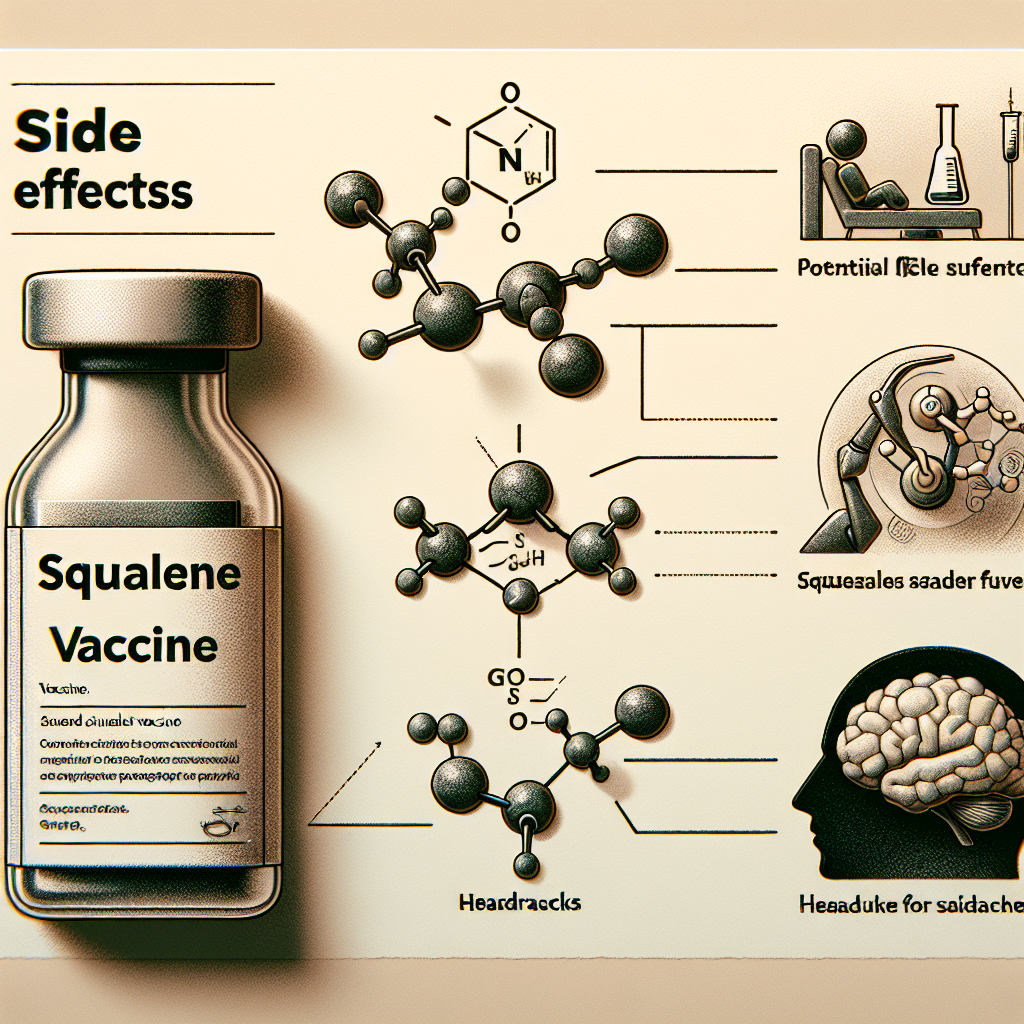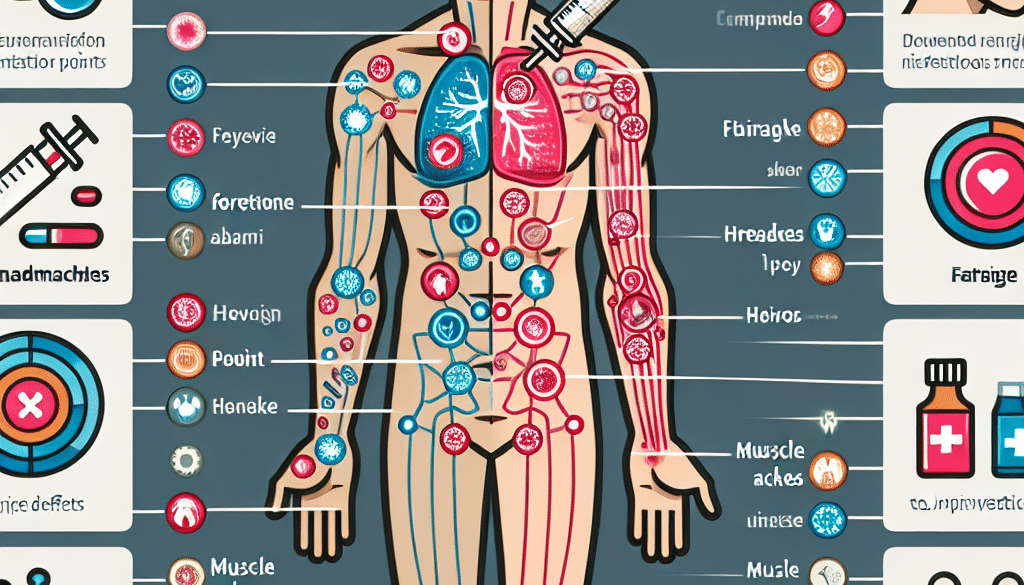Squalene Vaccine Side Effects: Explained
-
Table of Contents
- Squalene in Vaccines: Understanding Potential Side Effects
- What is Squalene?
- The Role of Squalene in Vaccines
- Potential Side Effects of Squalene in Vaccines
- Common Side Effects
- Rare and Serious Side Effects
- Case Studies and Research
- Regulatory Perspective on Squalene
- Conclusion: Balancing Benefits and Risks
- Explore ETprotein’s High-Quality Protein Products
Squalene in Vaccines: Understanding Potential Side Effects

Vaccines are critical tools in the fight against infectious diseases, and their development often involves the use of adjuvants to enhance the immune response. One such adjuvant is squalene, a natural organic compound that has been the subject of discussion regarding its safety and side effects. This article aims to provide a comprehensive overview of squalene, its role in vaccines, and the potential side effects associated with its use.
What is Squalene?
Squalene is a triterpene compound that is naturally produced by the liver and circulates in human blood. It’s also found in various natural sources, such as shark liver oil, olive oil, and other plant oils. In the context of vaccines, squalene is used as an adjuvant, a substance that enhances the body’s immune response to an antigen.
The Role of Squalene in Vaccines
Adjuvants like squalene are added to vaccines to improve their efficacy. They work by stimulating the immune system to respond more vigorously to the presence of the antigen contained in the vaccine, which can lead to a stronger and longer-lasting immunity.
- Enhancing Immune Response: Squalene helps to activate the immune system’s response to the vaccine’s antigen.
- Reducing the Amount of Antigen Needed: With the use of adjuvants, lower quantities of the antigen are required to achieve the desired immune response, making vaccine production more efficient.
- Improving Vaccine Stability: Adjuvants can contribute to the stability of vaccines, allowing them to remain effective for longer periods.
Potential Side Effects of Squalene in Vaccines
While squalene is generally considered safe for use in vaccines, there have been concerns about potential side effects. It’s important to differentiate between common, mild side effects and rare, more serious reactions.
Common Side Effects
Most side effects associated with squalene-containing vaccines are mild and similar to those of other vaccines. These may include:
- Injection site reactions (pain, redness, swelling)
- Mild fever
- Headache
- Muscle and joint aches
These symptoms typically resolve within a few days without the need for medical intervention.
Rare and Serious Side Effects
Concerns about squalene’s safety emerged following reports of Gulf War Syndrome, where veterans developed chronic symptoms that some speculated were linked to squalene-containing vaccines. However, extensive research, including studies by the U.S. Institute of Medicine, found no evidence that squalene was responsible for these symptoms.
Other rare but serious side effects that have been hypothesized include autoimmune disorders. Nonetheless, scientific reviews have not found a causal relationship between squalene adjuvants and autoimmune diseases.
Case Studies and Research
Several studies have investigated the safety profile of squalene-containing vaccines. For instance:
- A study published in the Journal of the American Medical Association found no increased risk of autoimmune diseases in individuals who received squalene-adjuvanted vaccines.
- The World Health Organization (WHO) has stated that squalene in vaccines has been used in European influenza vaccines since 1997, with millions of doses administered and no significant adverse effects attributable to the adjuvant.
These studies and others support the conclusion that squalene is a safe adjuvant when used in vaccines.
Regulatory Perspective on Squalene
Regulatory agencies around the world, including the U.S. Food and Drug Administration (FDA) and the European Medicines Agency (EMA), have approved the use of squalene-containing vaccines. These approvals are based on rigorous evaluation of safety and efficacy data from clinical trials.
Conclusion: Balancing Benefits and Risks
The inclusion of squalene in vaccines is a result of its ability to enhance immune responses and contribute to the overall effectiveness of vaccinations. While there are potential side effects, as with any medical intervention, the vast majority are mild and transient. Serious side effects are rare, and extensive research has not supported a link between squalene and long-term health issues.
It is crucial for individuals to discuss any concerns with healthcare providers and consider the substantial benefits of vaccination against the risks of side effects. The use of squalene in vaccines continues to be supported by scientific evidence and regulatory authorities as a safe and beneficial practice in immunization programs.
Explore ETprotein’s High-Quality Protein Products
After considering the role of squalene in vaccines and its safety profile, it’s also important to focus on overall health and nutrition. ETprotein offers a range of high-quality protein products that can contribute to a balanced diet and support immune health.
ETprotein’s offerings include organic and clear protein powders from rice, pea, watermelon seed, pumpkin seed, sunflower seed, mung bean, and peanut sources. These non-GMO, allergen-free proteins are ideal for various industries, including nutraceuticals, pharmaceuticals, and food and beverage.
For those interested in enhancing their products with premium proteins or seeking to develop new formulations, ETprotein provides tailored solutions to meet diverse protein needs. Contact ETprotein to explore their range and find out how their proteins can benefit your health and wellness products.
About ETprotein:
ETprotein, a reputable protein and L-(+)-Ergothioneine (EGT) Chinese factory manufacturer and supplier, is renowned for producing, stocking, exporting, and delivering the highest quality organic bulk vegan proteins and L-(+)-Ergothioneine. They include Organic rice protein, clear rice protein, pea protein, clear pea protein, watermelon seed protein, pumpkin seed protein, sunflower seed protein, mung bean protein, peanut protein, and L-(+)-Ergothioneine EGT Pharmaceutical grade, L-(+)-Ergothioneine EGT food grade, L-(+)-Ergothioneine EGT cosmetic grade, L-(+)-Ergothioneine EGT reference grade and L-(+)-Ergothioneine EGT standard. Their offerings, characterized by a neutral taste, non-GMO, allergen-free attributes, with L-(+)-Ergothioneine purity over 98%, 99%, cater to a diverse range of industries. They serve nutraceutical, pharmaceutical, cosmeceutical, veterinary, as well as food and beverage finished product distributors, traders, and manufacturers across Europe, USA, Canada, Australia, Thailand, Japan, Korea, Brazil, and Chile, among others.
ETprotein specialization includes exporting and delivering tailor-made protein powder and finished nutritional supplements. Their extensive product range covers sectors like Food and Beverage, Sports Nutrition, Weight Management, Dietary Supplements, Health and Wellness Products, and Infant Formula, ensuring comprehensive solutions to meet all your protein needs.
As a trusted company by leading global food and beverage brands and Fortune 500 companies, ETprotein reinforces China’s reputation in the global arena. For more information or to sample their products, please contact them and email sales(at)ETprotein.com today.














